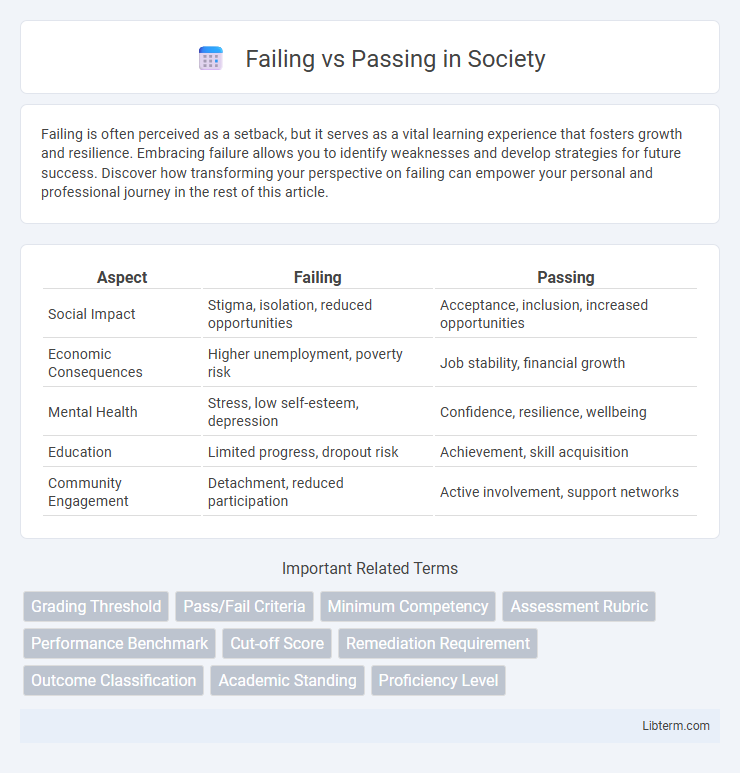Failing is often perceived as a setback, but it serves as a vital learning experience that fosters growth and resilience. Embracing failure allows you to identify weaknesses and develop strategies for future success. Discover how transforming your perspective on failing can empower your personal and professional journey in the rest of this article.
Table of Comparison
| Aspect | Failing | Passing |
|---|---|---|
| Social Impact | Stigma, isolation, reduced opportunities | Acceptance, inclusion, increased opportunities |
| Economic Consequences | Higher unemployment, poverty risk | Job stability, financial growth |
| Mental Health | Stress, low self-esteem, depression | Confidence, resilience, wellbeing |
| Education | Limited progress, dropout risk | Achievement, skill acquisition |
| Community Engagement | Detachment, reduced participation | Active involvement, support networks |
Understanding the Concepts: Failing vs Passing
Failing and passing represent two fundamental outcomes in assessment contexts, where passing indicates meeting or exceeding established criteria and failing signals a shortfall relative to these benchmarks. Understanding passing involves recognizing competence, mastery, or achievement of learning objectives, while failing highlights gaps in knowledge, skills, or performance standards. Clarifying these concepts helps educators tailor instruction and learners identify areas needing improvement for academic or professional growth.
The Psychological Impact of Success and Failure
Experiencing success or failure significantly shapes one's psychological well-being, influencing self-esteem and motivation. Success typically boosts confidence and reinforces positive behavioral patterns, while failure can lead to stress, anxiety, and decreased self-worth. Understanding these impacts is crucial for developing resilience and fostering a growth mindset in educational and professional settings.
Common Reasons for Failing and Passing
Common reasons for failing include lack of preparation, poor time management, and misunderstanding key concepts. Passing is often attributed to consistent study habits, effective comprehension of material, and active engagement during lessons. Mastery of subject matter and proper exam techniques significantly influence the outcome.
The Role of Mindset in Achievement
A growth mindset significantly influences the ability to transition from failing to passing by fostering resilience and continuous learning. Students who embrace challenges and perceive failures as opportunities for improvement tend to achieve higher academic success. Adopting a positive mindset enhances motivation, leading to better performance and long-term achievement.
Learning from Failure: Turning Setbacks into Opportunities
Failing provides critical insights that drive personal growth by highlighting areas for improvement and fostering resilience. Embracing setbacks as learning opportunities cultivates problem-solving skills and encourages innovation, leading to long-term success. Transformation from failure to achievement relies on reflective analysis and adaptive strategies that optimize future outcomes.
Celebrating Success: The Importance of Passing
Passing exams boosts confidence and opens opportunities for academic and career advancement. Celebrating success reinforces motivation and encourages continued effort toward future goals. Recognizing the achievement of passing nurtures a positive mindset essential for lifelong learning and personal growth.
Societal Perceptions of Failing vs Passing
Societal perceptions often equate passing with success and failing with inadequacy, heavily influencing individual self-worth and social status. Cultural norms and educational systems reinforce the stigma of failure, despite evidence that failure can foster resilience, creativity, and personal growth. Emphasizing a growth mindset shifts the narrative, encouraging society to value learning from failure as a crucial component of achievement and innovation.
Strategies to Improve Chances of Passing
Implementing targeted study techniques such as spaced repetition and active recall significantly boosts the likelihood of passing exams. Prioritizing time management and setting realistic goals allows for consistent progress while reducing last-minute cramming stress. Utilizing practice tests and seeking feedback from instructors help identify knowledge gaps and reinforce understanding, creating a strategic path to passing success.
Overcoming the Fear of Failure
Overcoming the fear of failure empowers individuals to embrace challenges and view setbacks as opportunities for growth. Understanding that failing is a natural part of the learning process reduces anxiety and builds resilience. Developing a growth mindset transforms fear into motivation, enabling continuous improvement and eventual success.
Building Resilience Through Both Failing and Passing
Experiencing both failing and passing is essential for building resilience, as failures promote critical self-reflection and adaptive problem-solving skills while successes reinforce motivation and confidence. Navigating setbacks cultivates emotional strength and perseverance, enabling individuals to approach future challenges with greater determination. Balanced exposure to both outcomes fosters a growth mindset that transforms obstacles into opportunities for continuous learning and improvement.
Failing Infographic

 libterm.com
libterm.com